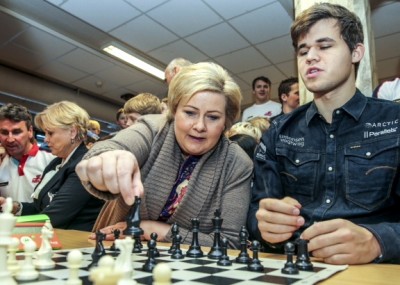In the four months since he was crowned world champion last November, 23-year-old Norwegian chess prodigy Magnus Carlsen has taken on billionaire businessmen and world leaders, snared a modelling contract with a trendy denim label, and launched a signature chess smartphone app designed to open up the game to a whole new generation (even though he admitted he can’t beat himself). Despite his growing empire, Carlsen said nothing much has changed for him personally – he has the same friends, feels the same pressure ahead of tournaments, and the drive to be the best is as strong as ever.

It’s an important couple of weeks for Carlsen. In Russia, which is making headlines entirely unrelated to chess these days, grandmasters are thrashing it out in the World Candidates Tournament until the start of April, to decide who will challenge Carlsen at the World Championship in November. “The game starts at 10 every day, so I’m almost interested enough to get up at 10,” said Carlsen, laughing. “No, but seriously, I follow them for several hours each day. The openings they play, I check them with my own databases. I follow it both as a professional but also as a chess fan, just enjoying some really great games.”
“I think the format is a good one, that the players know that they need to… I mean, there is only first place to play for,” he explained. “And you need to win a lot of games, so you need to play combative chess and I think that’s what people are showing. And it’s been a great show so far.”
Carlsen said one of the perks of being world champion was not having to compete in the candidates tournament, so that’s a lot of dedicated watching from a man who is supposed to be enjoying his downtime. He clearly lives and breathes chess and can rattle off his entire year’s work schedule – training ahead of a tournament in Azerbaijan in April against some of the world’s best players, then a tournament in Norway, before the World Chess Olympiad in Tromsø in August, then focusing on the world championship match.
‘I don’t think I’ve changed’
Yet the 23-year-old who’s worth millions in sponsorship deals, has beaten Norwegian Prime Minister Erna Solberg, Microsoft founder Bill Gates and Facebook founder Mark Zuckerberg. He models for G-Star Raw Denim, and has started his own own company. He is stumped for answers when it comes to what he has planned “for fun.”

“I don’t know,” he mused, as if it’s never crossed his mind. “I think the second half of the year, I mean after the Olympiad in August, there will be about three months before the world championship match. There will be a mixture between relaxation and work. We’ll see exactly what happens, who will be my opponent. I don’t know. I generally don’t go too much on holiday, if that’s more a vacation. I mean, I go many nice places for chess and otherwise I can relax at home. So that’s okay.” Carlsen’s halting answer makes it easy to believe him when he says he does not think the celebrity has affected him.
“I still live in the same place (in Norway), I have more or less the same friends, I hang out with the same people,” he went on, and said he doesn’t really think about the money he’s earning. “I think it’s a bit up to others to judge if it’s changed me or not. I don’t think it has to a great degree, but you should ask someone else if they feel that I’ve taken a turn for the worse!”
Carlsen said he doesn’t feel any extra strain under the weight of the title. “There’s not much sample size here, because I’ve only played really one serious tournament after I was world champion, but I think in that tournament it was much of the same,” he explained. “Even before I was world champion I was world number one for a while, so I sort of expected myself to do well in those tournaments. I always thought I was the favourite going in. And in that sense, nothing much has changed.”
Chess’s new white knight
Carlsen may not have changed himself, but he’s certainly changed the face of the game that’s made him internationally renowned. “Generally it’s good for any sport to have strong profiles, and chess has not had that so much recently,” explained Carlsen’s manager, Espen Agdestein. “In that sense it’s very good, of course.”
Off the back of the momentum his fame has bought the game, Carlsen launched an app called ‘Play Magnus’ earlier this year in a bid to get even more people interested in chess. The app is tuned to mimic Carlsen’s style from when he was five years old to the present day, based on data taken from his own matches. Players compete for the opportunity to take him on in real life, and each year top scorers and randomly-selected users will be offered the opportunity to meet and play Carlsen. On Wednesday, two Norwegians and an Italian user became the first to be chosen for the inaugural event, to be held in early 2015.
By mid-March the app had reached 100,000 downloads in 196 countries, and even Carlsen’s competitors were playing it. “I know that the French grandmaster, Maxime Vachier-Lagrave for instance, he’s now number 10 in the world, he’s been playing against Magnus 14,” Carlsen laughed. “But I have the feeling that’s more for amusement than training against me at least. But I don’t know, I think he was also struggling with that one. And if I remember correctly, I played him a few times when I was 14 and I won every time!”
Carlsen himself doesn’t like playing against computer programs, but said the app is more humanized. Yet he admitted he can’t even beat himself at his current ‘age 23’ level. “The next step for me is to try the levels from, let’s say, 16 to 19, I think that’s where I have a good chance,” he said. “So far I’ve tried Magnus 23, he was too tough for me!”
He said to beat himself he’d have to sit and play for a couple of hours, and that’s not the point of making chess accessible through app technology. “When you play chess you’re supposed to use your brain of course, but I think it’s still good that it has one of the elements of these mobile apps, that you spend 10 minutes on each game or something. When you play chess among friends or in clubs or so on when it’s offhand games, it’s usually a quick time control. People at all ages have short attention spans it seems, and that’s the way it always is when you play chess for fun, it’s usually five or 10 minutes, or even three minutes.”
Game or sport?
Carslen is keen to build chess’s profile as a sport, which he thinks will also help the game’s image. “I think professional chess has very much in common with other professional sports,” he argued. “The way I prepare for tournaments, the way I conduct myself during games and so on. It’s most comparable with sports, definitely. But again, I know that the Norwegian sports federation has another opinion, so,” he said wryly. In January, Carlsen won a swag of awards at Norway’s Sports Gala (Idrettsgallaen), but controversially wasn’t eligible for athlete of the year because the chess federation (Norges Sjakkforbund) isn’t part of the national athletics federation (Norges Idrettsforbund).
“I think it’s a bit of a shame because my experience traveling around is that kids find chess fun at an age where they don’t care whether something is cool, they don’t know what is considered cool, they just know whether something is fun or interesting or not,” he went on. “And I guess at a certain age, chess becomes less cool for some people. And I don’t think it needs to be that way. Maybe it will help if it’s considered a sport.”
Carlsen said he’s excited about the buzz he has generated in Norway, and said it’s great to hear children saying they want to be like him, instead of traditional cross-country skiing- or football stars. “I think that’s great that I can be a role model for them in the same way that they are,” he said on the shift in focus. “It shows that something is happening with chess in Norway. I think it’s great for the game of chess, and of course for me personally. Everyone loves to be admired!”
newsinenglish.no/Emily Woodgate

